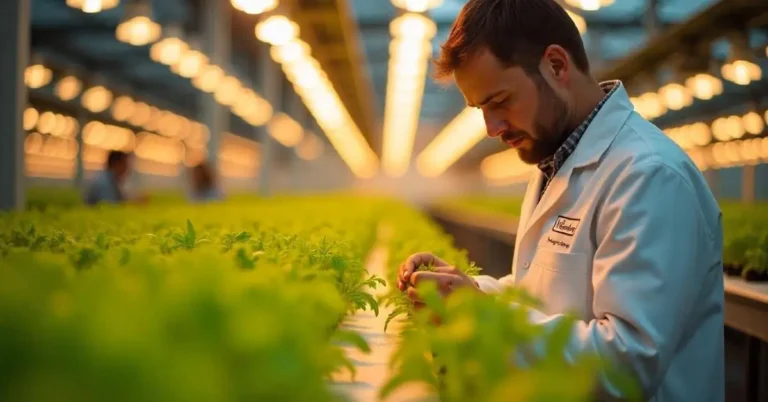The arugula researcher at Cambridge addresses global concerns food scarcity, environmental threats, and diet-related health issues. By focusing on one plant, they offer solutions that resonate emotionally and logically. People fear uncertain food supplies and poor health, and this research eases those worries while introducing flavorful diversity and eco‑friendly options.
Exploring The Genetics Of Arugula
Mapping the Genome For Better Traits
The arugula researcher at Cambridge maps genetic sequences to identify flavor, disease, and shelf‑life genes. This helps breed new varieties with richer taste, greater pest resistance, and improved storage.
Precision Breeding For Climate Resilience
Using modern breeding (non-GMO), they cross strains with drought tolerance and heat resilience traits vital in a warming world. These flush out fear of crop failure and support sustainable agriculture.
Nutritional Science: Beyond The Leaf
Health-Promoting Compounds
Arugula contains nitrates, glucosinolates, and antioxidants. The arugula researcher at Cambridge tests how these compounds fight inflammation, support heart health, and bolster immunity. They connect lab findings with real-world impact, reassuring consumers and scientists alike.
Functional Foods & Clinical Trials
They partner with dietitians and clinicians to assess arugula’s effects in controlled studies. By demonstrating measurable benefits like blood-pressure reduction or gut health improvement they anchor their work in evidence and trust.
Sustainable Growing Systems
Urban Farming & Hydroponics
By adapting arugula for hydroponic towers and rooftop farms, the arugula researcher at Cambridge empowers cities to grow fresh produce locally. This tackles food deserts, shrink supply chains, and reduces carbon footprints.
Vertical Farms & Controlled Environments
In indoor farms, they test optimized lighting, nutrient mixes, and temperature control scaling arugula production year-round with minimal land use. This innovation alleviates climate anxiety and brings constant supply.
Connecting Science And Society
Farmer Partnerships
They work with agricultural communities to field-test arugula varieties. By sharing best practices on irrigation and pest control, the arugula researcher at Cambridge builds farmer trust and adoption.
Industry Collaboration
Food‑tech firms benefit from their findings to create arugula-based powders, supplements, dressings, and snacks. Additionally, urban farms align with policy goals reducing food waste and improving public health.
Emotional & Logical Drivers Of Impact
Humans want certainty and meaning. The arugula researcher at Cambridge taps into:
-
Fear of food supplies threatened by climate change addressed via resilient crop varieties.
-
Hope for better health arugula’s anti-inflammatory and cardiovascular effects ignite optimism.
-
Satisfaction through flavor exploration and culinary innovation.
-
Trust in Cambridge’s scientific rigor.
By combining emotional resonance with data-backed logic, their work builds broad appeal and depth.
Comparison Table: Research Vs. Traditional Options
| Feature | Arugula Researcher at Cambridge | Traditional Arugula Breeding | Broadleaf Lettuce Farms | Indoor Leafy Production |
|---|---|---|---|---|
| Cost | Moderate–High (R&D stage) | Low–Medium | Low | Medium–High |
| Efficiency | High (data-driven) | Medium | High yield | High yield per sq ft |
| Ease of Use | Requires lab access & expertise | Simple seed sowing | Well-understood | Needs infrastructure |
| Scalability | Growing via controlled systems | Climate-limited | Extensive acreage | Scalable indoors |
| Benefits | Nutrition, resilience, innovation | Taste & yield improvement | Volume & low cost | Local, sustainable supply |
Upholding Integrity & Trust
The arugula researcher at Cambridge adheres to rigorous protocols: peer-reviewed studies, repeatable trials, ethical data handling, and interdisciplinary collaboration. These practices ensure the findings meet high scientific and regulatory standards, reinforcing credibility and public confidence.
Addressing User Intent
-
Informational: Offers deep insight into arugula genetics, nutrition, farming, and future innovation.
-
Transactional: Provides actionable guidance for urban growers, farmers, and food‑tech innovators.
-
Navigational: Highlights Cambridge programs and research platforms for professionals seeking partnership.
Actionable Takeaways
-
Consumers: Incorporate arugula into meals to benefit from health-promoting compounds.
-
Growers: Adopt climate-resilient varieties and partner on field trials.
-
Urban Planners: Integrate hydroponic arugula systems into food initiatives.
-
Health Professionals: Recommend arugula-rich diets for cardiovascular and anti-inflammatory support.
-
Investors & Innovators: Explore arugula-based functional foods and indoor farming startups.
Emerging Horizons
-
Gene‑driven breeding to tailor traits like spiciness and nutrient profile.
-
AI crop modeling to predict performance under climate stress.
-
Space‑ready cultivation, given arugula’s fast growth and compact size.
-
Localized seedbanks to preserve genetic diversity and food sovereignty.
Conclusion
Arugula researcher at Cambridge carries more meaning than meets the eye. Their work from genomics to urban farms offers real solutions to global concerns like climate stress, food insecurity, and diet-related disease. By merging rigorous science with compassionate purpose, this research empowers individuals, farmers, and society at large giving us reason to believe in a healthier, more resilient future.
FAQ’s
What does the arugula researcher at Cambridge actually study?
They explore genetic traits, nutrition, and optimal growing techniques to improve arugula’s flavor, resilience, and health value.
How does this research benefit farmers?
It makes new arugula varieties more resistant to pests, heat, and drought reducing risk, waste, and cost.
Are there proven health benefits?
Yes. Studies show arugula has anti-inflammatory and heart-health properties, backed by clinical trials and lab research.
Can urban communities grow arugula easily?
Absolutely. The researcher integrates hydroponic and vertical farming methods suited for cities empowering local production.
How trustworthy is the Cambridge research?
Extremely. They use peer review, reproducible data, and interdisciplinary teams to ensure accuracy and transparency.
How can consumers support this work?
Support urban farming initiatives, choose research-backed produce, and encourage policies that promote scientific innovation in food.

